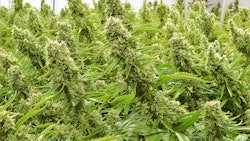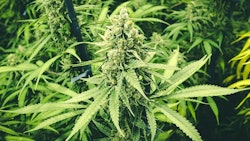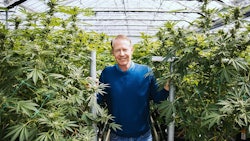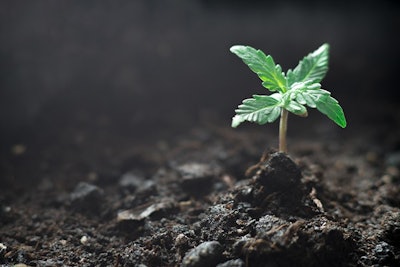
In a market with ever-increasing competition, cannabis companies must find their niche in order to have staying power. One way to accomplish this, according to Rubicon Organics CEO and Co-Founder Jesse McConnell, is to take advantage of organic certification.
Earlier this month, Rubicon Organics received an organic certification from the Fraser Valley Organic Producers Association (FVOPA) for its 125,000-square-foot hybrid greenhouse facility in Delta, B.C. Rubicon Organics is one of two cannabis companies in Canada to be certified by FVOPA, according to a company press release.
McConnell has worked in the cannabis industry for about 15 years, and previously founded Whistler, the first Canadian licensed producer to obtain organic certification, which was acquired by Aurora Cannabis earlier this year.
In founding Rubicon Organics, McConnell wanted to focus on producing super-premium quality products in an organic and environmentally sustainable way.
“We’ve done that through the production of very high-tech, fancy hybrid glasshouses that are essentially indoor facilities with glass roofs,” McConnell told Cannabis Business Times. “It’s environmentally friendly, it’s sustainable production, but super-premium quality and all done in living soils.”
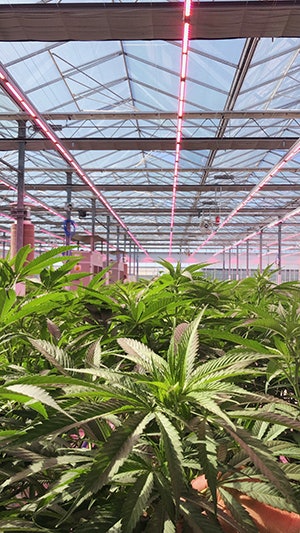
Rubicon Organics also owns a 40,000-square-foot hybrid greenhouse in Washington state, which it has leased to a state-licensed operator that is applying Rubicon Organics’ organic cultivation methods to produce cannabis that is then sold to a third-party brand.
In Canada, organic certification is completed by third party organizations like FVOPA and ECOCERT in adherence with the federal standard, called the Canadian Organic Standards. The Canadian government has been working on rules to include cannabis under its federal organic food regulations, McConnell said, and the industry is expecting to see final draft rules by the end of the year so that cannabis can be certified with the Canadian organic stamp beginning in 2020.
“When it comes to cannabis, FVOPA has applied the exact same standard that we will be held to coming up in the new year,” McConnell said.
The FVOPA certification program is also compliant with ISO 17065 and the B.C. Certified Organic program.
Several parameters must be met for a cannabis producer to become FVOPA-certified. First and foremost, Rubicon Organics had to show that all its plants are grown in soil that contains a certain amount of native compost, McConnell said.
“The biggest thing is really rich, vibrant soils that are essential for … the growing medium, and then FVOPA conducts a very extensive audit,” he said. “In fact, we have three inspections where they review the list of all your inputs and ensure that all of those inputs are considered certified organic. Then, they’ll come back and conduct multiple audits afterwards.”
FVOPA reviewed all of Rubicon Organics’ products and recipes to see the contents of the company’s fertilizers and soils. “We make our own soil and make our own fertilizers from scratch, all with local raw materials, so it’s very, very clean,” McConnell said. “Then they review all your pesticides and fungicides, which is a pretty short list for us.”
Rubicon Organics uses kelp and seaweed on its plants, he added, and FVOPA performed a complete audit of the facility to ensure that the products were being used in compliance with federal regulations.
After multiple audits, Rubicon Organics passed the standard.
“I think what the certification does is it lets our consumers know that we are being fully transparent when we say that we adhere to organic growing practices,” McConnell said. “It’s showing them that we are truly committed to sustainable production, that we are truly committed to not using chemical pesticides and fertilizers. You’re living your values, not just greenwashing, and I think a lot of companies like to use ‘environmental,’ ‘sustainable,’ and those kinds of terminologies to greenwash their products, and I think the consumer cares more about it than that.”
As the cannabis market continues to grow, successful companies will be the ones that choose a specific category and win in that category, McConnell added, and organic certification is one way that Rubicon Organics is setting its business apart from the crowd.
“We’re very simple,” he said. “We want to produce super-premium, certified-organic cannabis products, and we want people to choose our flower and our oils because they love cannabis. There are going to be many consumers who aren’t interested in that. Consumers who just want value—we’re not your choice. There will be someone who will do it better for cheaper for mid-grade product, but if you want really high-grade product, we’re going to be your first choice."









